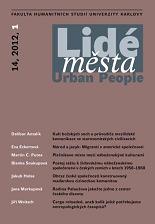Postoj státu k židovskému náboženskému společenství v českých zemích v letech 1956–1968: mezi kontrolou, represemi a "blahosklonností"
The Position of the State toward the Jewish Religious Community in the Czech Lands in 1956−1968: The Vicious Circle of Control, Repressions and...
Author(s): Blanka SoukupováSubject(s): Cultural Essay, Political Essay, Societal Essay
Published by: Univerzita Karlova v Praze - Fakulta humanitních studií
Keywords: state; Jewish religious community; so-called church politics; de-Stalinization; Prague Spring
Summary/Abstract: (The Position of the State toward the Jewish Religious Community in the Czech Lands in 1956−1968: The Vicious Circle of Control, Repressions and “Condescendence”). On October 14, 1949 the State Office for Church Affairs was established. This office was under the control of the Central Committee of the Communist Party of Czechoslovakia. This study analyses the pillars of so-called church politics (control, repressions, economically and politically motivated “condescendence” in Czechoslovakia – one of the satellites of the Soviet Union) in the time of de-Stalinization and in the period of so-called reform Communism, culminating with the Prague Spring (1968). It focuses on the Jewish community in the Czech Lands (in 1965, the community had six to seven thousand members, whereas in 1967, not even five thousand). The study also shows that during this period, church politics was an outgrowth of party politics, which maintained censorship and atheism. Communist propaganda misused the Jewish community by creating an image of the Soviet Union and its allies as conscious fighters for peace, fighting against fascism and neo-Nazism in capitalist states.
Journal: Lidé města
- Issue Year: 14/2012
- Issue No: 1
- Page Range: 73-105
- Page Count: 33
- Language: Czech

